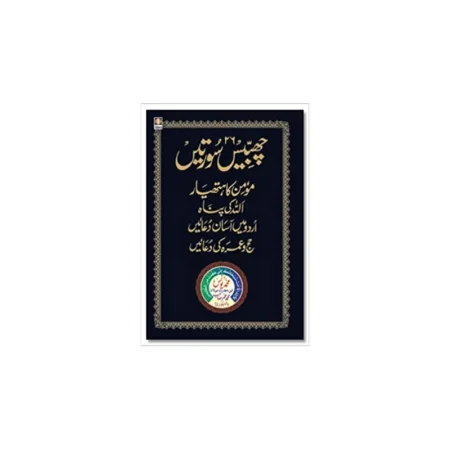Adab Al Qadi Islamic Legal And Judicial
₹470.00 Original price was: ₹470.00.₹352.50Current price is: ₹352.50.
- Name: Adab Al Qadi Islamic Legal And Judicial
- Writer: Imam Khassaf
- Translated By: Justice Dr. Munir Ahmad Mughal
- Publisher: Adam Publishers
- Language: English

Adab Al Qadi Islamic Legal And Judicial
₹470.00Original price was: ₹470.00.₹352.50Current price is: ₹352.50.Request a Call Back
This contact form is available only for logged in users.
- Delivery & Return
How Does The Delivery Process Work ?
- Once Our System Processes Your Order, Your Products Are Inspected Thoroughly To Ensure They Are In Perfect Condition.
- After They Pass Through The Final Round Of Quality Checks, They Are Packed And Handed Over To Our Trusted Courier Partners.
- Our Delivery Partners Then Bring The Package To You At The Earliest Possibility. In Case, They Are Unable To Reach Your Provided Address Or At A Suitable Time, They Will Contact You To Resolve The Issue.
How Are Items Packed ?
We Package Our Products In Corrugated Boxes, Which Are Covered With 3 Layer Protection. Each Individual Product Is Packed In Bubble Wrap While Fragile Items Like Bottles Are Safely Secured With Additional Bubble Wrap. We Pride Ourselves On The Quality Of Our Packaging.What Is The Range Of Locations To Which Daarul Kitab & Islamic Store Ships It’s Products ?
We Shipped Our Products Pan India!My Order Has Been Shipped, How Can I Track It ?
Once Your Order Has Been Dispatched, You Will Receive An Email And SMS With Tracking Details.You Can Track The Status Of Your Order Within 24 – 48 Hours After Your Order Is Dispatched From Our Warehouse.Following Are Some Of Our Trusted Courier Partners: eKart Logistics, BlueDart, Delhivery, Xpressbees, Ecom Express, DTDC & ShadowfaxWhat Is The Estimated Delivery Time ?
It Takes 3-7 Business Days To Deliver The Order Once Order Has Been Dispatched.Though We Keep 95% Of Our Catalog In Our Inventory, Certain Products Need To Be Sourced Directly From The Brand Itself So That We Can Live Up To Our Promise Of Providing Fresh, Non-expired Products.Are There Any Shipping Charges Applicable To My Order ?
We Have Different Shipping Charges For Different Zones Which Start From 60₹ To 100₹ Is Applied To All Orders Below ₹1999, While There Is Free Shipping For All Orders Above ₹1999Note: Please Take A Video/Photos While Opening A Order You Received We Need It If Anything Goes Wrong With You Order Between Journey Of Our Warehouse To Your Doorstep, If You Find Order Is Damaged Or Intact Please Do Not Accept The Order Delivery .
Disclaimer: Any Complaints Related To Product/Delivery Should Be Brought To Our Notice Within 48 Hours From The Time Of Delivery.
Help
Give us a shout if you have any other questions and/or concerns. Email: support@daarulkitab.com Phone: +918755553311 WhatsApp: +918755553311 - Ask a Question

Adab Al Qadi Islamic Legal And Judicial
₹470.00Original price was: ₹470.00.₹352.50Current price is: ₹352.50.Ask a Question
This contact form is available only for logged in users.
Adab Al Qadi Islamic Legal And Judicial
Overview: “Adab Al Qadi” explores the principles and etiquette that judges in the Islamic legal system should adhere to. The book delves into the moral and ethical standards required of judges based on Islamic teachings from the Quran and the Sunnah. It provides insights into the responsibilities, conduct, and decision-making processes of judges to ensure justice and fairness in the judicial system.
Key Themes:
- Moral and Ethical Standards:
- The book outlines the high moral and ethical standards that judges must uphold. It emphasizes qualities such as integrity, honesty, impartiality, and piety.
- Responsibilities of Judges:
- Details the various responsibilities of judges, including the duty to seek justice, protect the rights of individuals, and uphold the rule of law. The book highlights the importance of diligence and thoroughness in the judicial process.
- Conduct in Court:
- Discusses the appropriate conduct and demeanor that judges should maintain in court. This includes displaying patience, humility, and respect towards all parties involved in a case.
- Decision-Making Process:
- Provides guidance on the decision-making process for judges. The book emphasizes the need for careful consideration of evidence, adherence to legal principles, and reliance on Islamic jurisprudence in making fair and just rulings.
- Avoiding Bias and Prejudice:
- Addresses the importance of avoiding bias and prejudice in the judicial process. The book encourages judges to be impartial and objective, ensuring that personal feelings or external influences do not affect their judgments.
- Accountability:
- Highlights the accountability of judges to both the community and Allah. The book underscores the significance of judges being answerable for their actions and decisions, fostering a sense of responsibility and ethical conduct.
Purpose: The primary purpose of “Adab Al Qadi” is to provide a comprehensive guide for judges in the Islamic legal system, ensuring that they uphold the highest standards of ethics and justice. The book aims to educate and inspire judges to perform their duties with integrity, fairness, and a deep sense of responsibility.
| Weight | 400 g |
|---|---|
| Dimensions | 10 × 10 × 10 cm |
Related Products
- 26 Chabbis Surtein Momin Ka Hathyar Allah Ki Panah Muhammad Yunus Idara (Urdu)
4 in stock
- Chalo Chahat Nibhae Hum ( Sabas Gul ) Pak Urdu
1 in stock
- Paperback
- Publisher: Idara impex (2006)
- Language: English
3 in stock
1 in stock
10 in stock
- Aakhri Ahd-E-Mughliya Ka Hindustan Dr Mubarak Ali Al Hasanat (Urdu)
2 in stock
- Hardcover:?350 pages
- Publisher:?Al Hasanat Books Pvt. Ltd.; 1 edition (2015)
- Language:?Urdu
1 in stock
- Hardcover
- Publisher: Unknown (January 1, 2013)
- Language: English
4 in stock
2 in stock
1 in stock
- 26 Chabbis Suraten Mohd Yunus Ibn Hazrat Maulana Mohd Umar Sahab Palanpuri Ra) Farid Arabic/Urdu
3 in stock
- Zikr-E-Rasool S.A.W. ( Maulana Abdul Majid ) Lucknow Urdu
6 in stock














